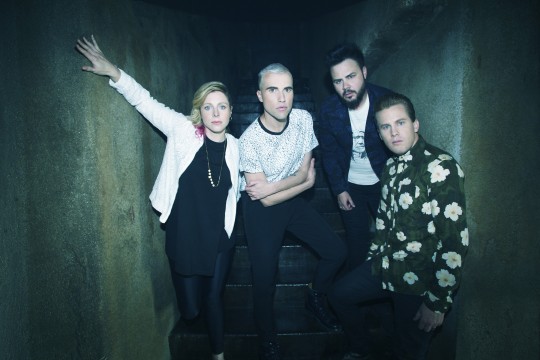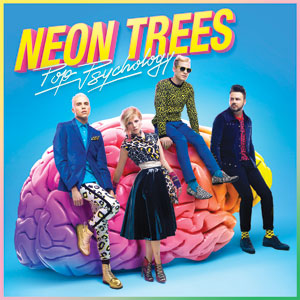Neon Trees’ gay frontman Tyler Glenn is a nice guy: Funny, smart and thoughtful, he’s the kind of artist who makes the interview process an enjoyable one. So it’s not all that surprising that Tyler’s band also comes off as funny, smart and thoughtful, especially on its latest release, Pop Psychology (Mercury). A more personal effort than the quartet’s previous releases, many of the songs involve serious subject matter. But instead of getting bogged down, the music, which is buoyant and brilliant dance-pop, elevates the songs and the mood, sort of like a musical anti-depressant.
Neon Trees will perform in the intimate space of the Granada on June 18. Before the concert, Gregg Shapiro talked to Glenn about the band’s name, being pigeonholed in a genre and what the reaction has been by fans to coming out (it’s not what you’d expect).
Dallas Voice: For the few uninitiated, say something about the genesis of the name of the band. Tyler Glenn: I was with friends in high school and we would hang at a burger establishment called In-N-Out in California. It was one of the older, more original ones. They had these palm tree lights. We thought Neon Palm Trees sounded like a cool band name. I always kept it in the back of my mind [laughs]. Unfortunately, we are kind of tied to fast food [laughs].
Were other names in contention? There was always a list of names that my guitar player and I had, but a lot of the names were either too dark and serious for the type of music that we wanted to make or a lot of them were [the names of] smaller bands that I thought no one knew. I don’t know what I was thinking. “No one knows this band, so we’ll have this name.” It was very immature of me. I don’t think there were any viable options, really.
Neon has been a popular component of bands’ names — Neon Trees, Neon Indian, Neon Hitch, Neon Neon. Why do you think that is? Yeah! I don’t know. That was definitely a concern. We had had our name for a long time. We had been a band before we put out our first record for quite a while. When we put out our first record in 2010, that’s when Neon Indian put their record out, and then Neon Hitch. We found out that that is actually Neon Hitch’s name. Her parents gave it to her. She couldn’t go changing her name [laughs] and we couldn’t fault her for that. I don’t know the answer; maybe the connotation with new wave music or something.
Speaking of new wave music, on Habits, Neon Trees’ full-length major-label debut, there is a song titled “1983” which is followed by the song “Girls and Boys In School,” which recalls New Order in 1983. Can you please say something about the both the musical significance of the year 1983 and the band New Order for Neon Trees? The song 1983 is about the year I was born, but it’s not really about the year. The song’s more about maintaining that level of innocence before love gets tainted, for me anyway. I think the song definitely took a more literal approach in the music video. I think listeners looked at us and thought, “Oh, they love the ’80s” [laughs]. But I think the song was more a nostalgic thing for me, in terms of innocence and youth. New Order has always been a massive influence on the band. I love their hybrid of electronic music and the roots of it and how it started as a band back with Joy Division, when it was more guitar-based, I thought they did that really well. And Peter Hook’s bass-playing is timeless. I’ve always been highly influenced by that band, for sure.
Back in 1983, radio and MTV were the main places to hear cool music, such as New Order. Now bands have to find other ways to get exposure, including having their music used in advertisements. Neon Trees were fortunate enough to have a song, “Everybody Talks,” from the Picture Show disc, featured in a Buick commercial. What did that experience mean to you? I loved that they put us in it, so it felt like we were being used as more than just a song over a bunch of shiny cars. I think there was a quirkiness to it that was very much us. I was happy with the finished commercial. To this day, [some] people recall it as a Neon Trees commercial. It was crucial in propelling the song from just a modest radio hit to one of the bigger songs of that year. I loved how it worked. It doesn’t always happen that way when you license your music. It was a cool opportunity.
 You’ve been “openly Mormon” for a long time, but came out as gay last year. What has the reaction been since you came out? It’s been way more interesting than I expected. I didn’t think it would still be something I would be talking about, but I’m happy to because I think people are intrigued with my point of view revolving around my faith as well. I’m happy that I’ve been able to do it in a really honest way. The reaction has been really nice. The worst things I heard were maybe from gay atheists [laughs], because they were OK and excited about me coming out, but they were mad at me that I’m still religious.
You’ve been “openly Mormon” for a long time, but came out as gay last year. What has the reaction been since you came out? It’s been way more interesting than I expected. I didn’t think it would still be something I would be talking about, but I’m happy to because I think people are intrigued with my point of view revolving around my faith as well. I’m happy that I’ve been able to do it in a really honest way. The reaction has been really nice. The worst things I heard were maybe from gay atheists [laughs], because they were OK and excited about me coming out, but they were mad at me that I’m still religious.
Three albums in four years would be considered prolific in anybody’s book. Is that kind of productivity part of Neon Trees’ long-term plans? Yes. I think we get bored if we’re not putting out new stuff. We’ve always been into the old model of bands putting out [records yearly]. If we could, I would love to put a record out every year. I also feel like — I don’t know if it’s everyone’s label — but our label puts a lot into the first song and they put a lot into the record release, but they don’t do much past that. If we have to write a new record every time to get attention from our label [laughs], I’m okay with that. I’ll continue to write records.
The songs on Pop Psychology are as colorful as the artwork for the album. Please say something about that sonic shift. I set out to make a really dark record. When I started writing the third album I was talking to my therapist a lot. I still do. But I was just talking to her and getting through some stuff. What I was writing lent itself to that sort of theme. By the time it came to hunker down and make a focused body of work, I was in a really happy place. I didn’t want [the record] to reflect where I’d been, but where I was at [during] the current time. I was interested in writing something colorful and anthemic and celebratory. The themes — it talks about identity and the troubles of finding love with technology — that I set out are still there, but I think it reflects a more colorful view on love. I also love the Pop Psychology name. I thought it was a great name for a record and it fits everything about it.
This article appeared in the Dallas Voice print edition June 12, 2015.

